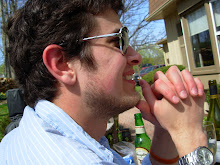Wednesday, January 30, 2008
Simon Bar Kochba שמעון בר כוכבא
I realized that my comment on mispronouncing Kosiba might bring some curiosity about why I would be talking about someone named Kosiba at a church. I actually love the story because of its parallels with the story of Jesus. I use it often as a way to tell about Messianic expectation or to compare Kochba with Jesus. If my sources are accurate only Jesus and Bar Kochba are explicitly recognized as Messiah in the histories. Anyway, here is a link that tells his story:
Tuesday, January 29, 2008
Encounter Teaching

For those of you who don't know, I am a pastor at a church up here in the suburbs of Philly (formerly an 'associate pastor' until this past week). I teach about once a month but I haven't ever put any links to my teachings up here...until now. Comments and critiques are welcome, unless it's Art ragging me for my mispronunciation of Simon ben Kosiba (I really wrestled with how to pronounce it, fighting off my years of mispronunciation!)
Sunday, January 27, 2008
Finally...Someone gets it
For my first post back from Christmas hiatus, I would like to recommend a book I have been reading this past week. It's about a year old now but is worth reading. It's James K.A. Smith's Who's Afraid of Postmodernism. It has been an easy-to-read (for the very basic philosophical literate) epistemological breath of fresh air in the midst of a polluted world of badly argued Christian critiques against men like J. Derrida, M. Foucault, and Lyotard. Even though I agree with where Smith takes a lot of his arguments, the main thing I appreciate is that he is competent enough to bring Derrida to the realm of the understandable without misunderstanding and misapplying him (unless he consciously chooses to).
But further than just giving Derrida a fair read, Smith agrees with the basic sentiment of Derrida that "There is nothing outside the text." And yet, he argues that this isn't antithetical to the Christian faith but in fact has bailed us out of an unholy marriage with modernity. Sadly enough, he had to spend a fair number of pages showing that Derrida does in fact believe in things and that he is not simply saying that the cup I see before me is a jumbled mess of letters. Are you serious? But hey, it had to be done. Anyway, I have made it only through the section on Derrida, but if the rest is like the first, it will be a great introduction to how Christians can/should respond/resist/absorb ideas from some great thinkers.
Is it just me or would Christianity not be in the mess it's in if it would've just listened to Kierkegaard in the first place? Truth is Subjectivity...ring a bell?
Subscribe to:
Comments (Atom)




